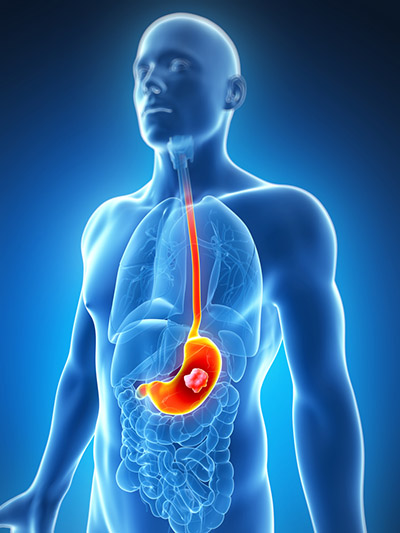Gastric Cancer Surgery
What is a gastrectomy?
 Gastrectomy describes the removal of the stomach. This can be complete or partial depending on the type and location of the cancer. The LSG specializes in gastric cancer surgery in London.
Gastrectomy describes the removal of the stomach. This can be complete or partial depending on the type and location of the cancer. The LSG specializes in gastric cancer surgery in London.
Before surgery, the exact location, size and type of the tumour will be assessed. If the cancer is in the top part of the stomach then the whole stomach needs to be removed. Preservation of the bottom part of the stomach is not performed as this leads to reflux problems. If the cancer is in the bottom part of the stomach, the top part can be preserved.
It is also important to remove the surrounding tissue (lymphatics) at the same time as the surgery as this may also contain cancer cells. The analysis of this tissue gives information on the extent or staging of the cancer.
How is it performed?
This will depend on the site and size of the cancer. Keyhole techniques are used to remove smaller tumours, but a small scar will always be required to remove the specimen itself. Once the procedure is performed the bowel is joined together again to allow the normal passage of food.
How long are you in hospital for?
Most patients are in hospital between 8-10 days. This will be shorter for partial operations. The majority of the recovery time is getting used to an oral diet after the surgery. Most patients are ambulatory at 3-4 days after surgery.
What are the risks?
The main concern after surgery is to ensure there is no failure between the joins of the bowel. For this reason, it is common practice to perform a contrast test a few days after the procedure to check the joins before an oral diet is started. This involves drinking fluid whilst an x-ray is taken.
If a failure or leak is detected then further surgery maybe required. However, these situations are not common and can often be managed expectantly.
It is very important after surgery to ensure that breathing exercises are performed regularly. Physiotherapists are a crucial part of post-operative recovery as they prevent post-operative chest infections by encouraging deep breathing and early mobilisation.
How long will it take to recover?
You will not be allowed to leave hospital until you can walk up a flight of stairs unaided and can perform all the tasks, which will be required when you get home. Different members of the team will be involved in making this decision including surgeons, dieticians, physiotherapists and nursing staff.
When can I go back to work?
It usually takes a few weeks before patients feel they can go back to work after the more major procedures. It is not uncommon to feel tired for the first few months after surgery. If further chemotherapy is required this will extend the period of recovery. For some patients it will take between 6 to 12 months to regain normal quality of life after their treatment.
When can I drive?
Driving should be avoided for the first few weeks after surgery. Once you can perform an emergency stop in a stationary vehicle and turn to view your blind spot then driving should be safe. It is preferable to contact your insurance company to check for any specific instructions they may have.
How am I followed up?
You will be seen regularly after the surgery as part of a formal follow up plan. Any difficulties with eating will be discussed and your weight will be monitored. You will also be checked for any vitamin or iron deficiencies after the surgery.
Who do I contact if there are concerns?
The group practice telephone is answered in working hours and messages can be left out of hours. Any concerns will be relayed directly to one of the consultant surgeons on receipt. The hospital ward also provides a 24/7 means of contact. They will contact the consultant about any concerns and are able to give advice if required.
For more information on gastric cancer surgery in London, please contact us on info@londonsurgicalgroup.




